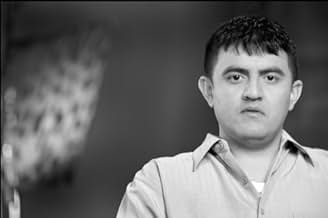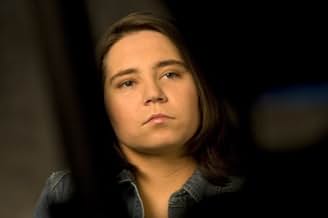IMDb-BEWERTUNG
7,4/10
4168
IHRE BEWERTUNG
Füge eine Handlung in deiner Sprache hinzuErrol Morris examines the incidents of abuse and torture of suspected terrorists at the hands of U.S. forces at the Abu Ghraib prison.Errol Morris examines the incidents of abuse and torture of suspected terrorists at the hands of U.S. forces at the Abu Ghraib prison.Errol Morris examines the incidents of abuse and torture of suspected terrorists at the hands of U.S. forces at the Abu Ghraib prison.
- Auszeichnungen
- 3 Gewinne & 20 Nominierungen insgesamt
Christopher Bradley
- Military Police
- (as Chris Bradley)
Joshua Feinman
- Military Police
- (as Josh Feinman)
Jeff L. Green
- Military Police
- (as Jeff Green)
Empfohlene Bewertungen
Respectful silence from the audience throughout. Not a word spoken by anyone exiting the theatre afterwards. Standard Operating Procedure is the film no one is talking about.
Errol Morris' documentary on the abuse of detainees at Abu Ghraib prison is smart and informative. While talking head interviews with the people directly and indirectly involved provide the backbone, cinematic reconstructions of 2003s grizzly events coupled with the well known photographs taken by soldiers work successfully at pulling an emotional response from the viewer.
Though intriguing, SOP doesn't really benefit from the big screen treatment and would probably have just as much impact if viewed on TV.
Dark and depressing, shocking and enlightening: SOP is 2008's must see documentary.
Errol Morris' documentary on the abuse of detainees at Abu Ghraib prison is smart and informative. While talking head interviews with the people directly and indirectly involved provide the backbone, cinematic reconstructions of 2003s grizzly events coupled with the well known photographs taken by soldiers work successfully at pulling an emotional response from the viewer.
Though intriguing, SOP doesn't really benefit from the big screen treatment and would probably have just as much impact if viewed on TV.
Dark and depressing, shocking and enlightening: SOP is 2008's must see documentary.
"Standard Operating Procedure" is without a doubt one of the most terrifying films to come out in the last few years. It is a bold documentary which may be at times too gut-wrenching for some people to watch, not that this should ever prevent anybody from seeing it. It was a good decision to look at the events at Abu Gharib mainly through the eyes of the convicted military officers; and of course the photographs speak for themselves. Apart from the depth of the material, the filmmakers have done an outstanding job with the enactments, the visuals and the brilliant music by Danny Elfman. Although the documentary does point out and emphasize that high-ranking officers were never imprisoned for the depicted crimes, in my opinion, the film does fail to ask many essential questions that I feel should have been included in this documentary. Such as: Why do we insist seeing these events as more of an embarrassment on the part of the U.S. than an insult on the Iraqi prisoners? Since the soldiers frequently mention that they are "just following orders", who exactly are these orders coming from? Why will the U.S. Military not allow Charles Graner to be interviewed? What kind of a system is this that can categorize a completely naked "detainee" handcuffed backwards to his bed or another prisoner made to stand for a long time in a difficult position by the fear of being electrocuted as "standard operating procedure"? I am aware that the answers to these questions would stretch the format the director has chosen for this documentary, but I still believe that Errol Morris should have looked more openly into these territories in order to have made an even bolder film; and bold, courageous and very well made this film certainly is.
I'm a proud American despite all the people going on vacation saying their Canadian. (grow up take some responsibility & know at least SOME of what's going on in the world huh? Unless your teenager because you are terribly self-centered and can't really help it, thanks hormones!) Anyway this is just another example of the 2 sides to a story and how the lowest rank are always the ones that take the fall. Nobody above a Staff Sargent was ever charged, that's non-commissioned officer's. Imagine that?! This is a very revealing portrait that shows just how screwed up the military can be in times of war & in general. The investigator made a couple outstanding points: 1. if there were never any pictures, we never would have heard of this. 2. The Colonels/Generals can be extremely intimidating to a young 18 year old just out of his parents house for the 1st time. Hell you don't have to have a High School education to get in the military anymore, so these kids don't really have an understanding that a hardened military man has who has seen everything. I don't care what anyone says, this is a pretty good look & is pretty fair in it's portrayal of everything & everyone involved. The people seemed to be puppets more than anything & the higher ranks KNEW what was happening. When people are going to learn that TORTURE DOESN'T WORK is beyond me. People will say anything under the right condition to get out of the pain they are being in. This is interesting documentary & maybe it will keep a few from getting involved in things that are beyond there comprehension or capability. I'm not a politician nor want to be, (they make me sick) but getting out of the war is going to be mess just like every other war & it is going to be a no-win issue no matter what we do which is really sad. Give this doc a try & try not be moved by the issues.
Errol Morris has covered some interesting and weird subjects and I found his last film (Fog of War) to be quite fascinating, so I was looking forward to seeing where he went next. I was quite surprised that he chose to do a documentary on Iraq. Sure, it is totally the subject of our time but it has become a very cluttered subject not only in documentary films but also the amount of news coverage etc that is available. When I learnt that the film would be a tight focus on Abu Ghraib I hoped that Morris would explore the total human aspect of it and do a really good job of delivering this part of it.
Unfortunately what Morris manages to produce is a film that is solid but not as remarkable as the subject deserves. Part of this, it must be said, is familiarity with the subject; having seen many films that do it better. Taxi to the Dark Side comes to mind specifically because it uses the prison as its starting point before following the smell upwards and outwards to paint a much bigger picture of failure and things that are impacting beyond specific acts of torture. By remaining within the world of the prison, Morris potentially could do enough to standout as being THE film on the subject. The early signs are good because I was surprised to see several of the main names/faces that I knew from the news coverage of the scandal and thus this was going to be the story from those involved firsthand. This was a gamble in a way because the problem with the aftermath of Abu Ghraib was that it was only the "little people" that got the spotlight and nobody else and, by focusing on them, Morris needed to get a lot from them or else his film would end up the same way.
He does this to a point as they discuss in detail what they did and what they saw and it does still have the power to shock and depress. In some regards the anger described makes the violence a little understandable but what I was shocked by was the sheer banality and boredom-inspired viciousness of it all. It helps this aspect that so many of the contributions are delivered in such matter-of-fact manners that it does jar that they don't seem shocked by what they are describing. The truth is probably that they aren't partly because it was "normal" but also that they have discussed it many times. Everyone is a bit defensive and Morris doesn't ever manage to draw much emotion from them in the telling factually the material is engaging but Morris never really gets beyond that. While "Taxi to the Dark Side" moved up the chain of command, Morris needed to move into his interviewees' soul something he doesn't manage to do.
The second failing of the film is the overuse of "recreated" scenes and asides. In Thin Blue Line, it cost him (at very least) an Oscar nomination but here it has a negative impact immediately as you are watching it. With so much shocking reality to discuss and so many real images, some of the recreations are clunky in how out of place they are. I'm not talking about the creative sequences that Morris uses as a bed for dialogue (eg a cellblock full of shredded paper, the letters written back to a partner in the US) but rather the recreations and stuff "around" the pictures. It was unnecessary and distracted from what as real and powerful enough.
The film still works as a good summary of events within Abu Ghraib but it is hard to get excited about it since so much of it feels familiar. The tight focus itself is not an issue but it is when Morris cannot manage to produce searing questions, a bigger picture or intimate soul-searching it doesn't ever do anything that makes it standout in a crowded marketplace.
Unfortunately what Morris manages to produce is a film that is solid but not as remarkable as the subject deserves. Part of this, it must be said, is familiarity with the subject; having seen many films that do it better. Taxi to the Dark Side comes to mind specifically because it uses the prison as its starting point before following the smell upwards and outwards to paint a much bigger picture of failure and things that are impacting beyond specific acts of torture. By remaining within the world of the prison, Morris potentially could do enough to standout as being THE film on the subject. The early signs are good because I was surprised to see several of the main names/faces that I knew from the news coverage of the scandal and thus this was going to be the story from those involved firsthand. This was a gamble in a way because the problem with the aftermath of Abu Ghraib was that it was only the "little people" that got the spotlight and nobody else and, by focusing on them, Morris needed to get a lot from them or else his film would end up the same way.
He does this to a point as they discuss in detail what they did and what they saw and it does still have the power to shock and depress. In some regards the anger described makes the violence a little understandable but what I was shocked by was the sheer banality and boredom-inspired viciousness of it all. It helps this aspect that so many of the contributions are delivered in such matter-of-fact manners that it does jar that they don't seem shocked by what they are describing. The truth is probably that they aren't partly because it was "normal" but also that they have discussed it many times. Everyone is a bit defensive and Morris doesn't ever manage to draw much emotion from them in the telling factually the material is engaging but Morris never really gets beyond that. While "Taxi to the Dark Side" moved up the chain of command, Morris needed to move into his interviewees' soul something he doesn't manage to do.
The second failing of the film is the overuse of "recreated" scenes and asides. In Thin Blue Line, it cost him (at very least) an Oscar nomination but here it has a negative impact immediately as you are watching it. With so much shocking reality to discuss and so many real images, some of the recreations are clunky in how out of place they are. I'm not talking about the creative sequences that Morris uses as a bed for dialogue (eg a cellblock full of shredded paper, the letters written back to a partner in the US) but rather the recreations and stuff "around" the pictures. It was unnecessary and distracted from what as real and powerful enough.
The film still works as a good summary of events within Abu Ghraib but it is hard to get excited about it since so much of it feels familiar. The tight focus itself is not an issue but it is when Morris cannot manage to produce searing questions, a bigger picture or intimate soul-searching it doesn't ever do anything that makes it standout in a crowded marketplace.
Standard Operating Procedure (2008) ***1/2
What's in a picture? They say its worth a thousand words, but how many words are what's not in a picture worth. How about thousands of pictures? That conundrum is one of the major foci of Errol Morris, the eccentric genius documentarian's new project, Standard Operating Procedure. Although I was not engaged as I was with Morris's other works, Standard Operating Procedure is still a brilliant and fascinating look at the Abu Ghraib photo scandal.
Morris interviews through the interrotron numerous members of the staff at Abu Ghraib prison. They give their thoughts on their complicity in acts of torture, and reflect back on their experiences. One of the film's major attractions is Lynndie English, that now infamous young woman so maliciously captured on film.
What comes across most intently is that they were just doing what they were told. Those orders always come from off camera left or right. No one above Staff Sergeant was ever charged with anything. This is a point the documentary tries to drive home. In any bureaucratic structure, the big dogs never take the fall. You always sacrifice your little men, your pawns. If people knew what was really going on at the top, they would most surely revolt, or at the very least make a stink, and that would be it for you.
Morris interviews one person who claims she took pictures because she knew it was wrong, to show the world. Is she telling the truth? Well she also discusses how it was "kinda fun" sometimes. She is probably guilty and innocent on all counts.
Morris delves into his subject matter with his usual detective style. He says very little, and of course never ever dares show his face on camera. He only prompts from time to time. He has a style that is uniquely his own in the documentary world. I did not find Standard Operating Procedure to be on the same level as say The Fog of War or Gates of Heaven. But then again how many are? This is a more than worthy addition to the Morris repertoire.
What's in a picture? They say its worth a thousand words, but how many words are what's not in a picture worth. How about thousands of pictures? That conundrum is one of the major foci of Errol Morris, the eccentric genius documentarian's new project, Standard Operating Procedure. Although I was not engaged as I was with Morris's other works, Standard Operating Procedure is still a brilliant and fascinating look at the Abu Ghraib photo scandal.
Morris interviews through the interrotron numerous members of the staff at Abu Ghraib prison. They give their thoughts on their complicity in acts of torture, and reflect back on their experiences. One of the film's major attractions is Lynndie English, that now infamous young woman so maliciously captured on film.
What comes across most intently is that they were just doing what they were told. Those orders always come from off camera left or right. No one above Staff Sergeant was ever charged with anything. This is a point the documentary tries to drive home. In any bureaucratic structure, the big dogs never take the fall. You always sacrifice your little men, your pawns. If people knew what was really going on at the top, they would most surely revolt, or at the very least make a stink, and that would be it for you.
Morris interviews one person who claims she took pictures because she knew it was wrong, to show the world. Is she telling the truth? Well she also discusses how it was "kinda fun" sometimes. She is probably guilty and innocent on all counts.
Morris delves into his subject matter with his usual detective style. He says very little, and of course never ever dares show his face on camera. He only prompts from time to time. He has a style that is uniquely his own in the documentary world. I did not find Standard Operating Procedure to be on the same level as say The Fog of War or Gates of Heaven. But then again how many are? This is a more than worthy addition to the Morris repertoire.
Wusstest du schon
- WissenswertesFirst documentary ever to be nominated for the Silver Bear at the Berlin Film Festival (2008).
- Zitate
Tim Dugan, civilian interrogator (as himself): You gotta consider yourself dead, and if you come back, you're just a lucky bastard, you know. But if you're there, and you consider yourself already dead, you can do all the shit you have to do. I wouldn't recommend a vacation to Iraq anytime soon.
Top-Auswahl
Melde dich zum Bewerten an und greife auf die Watchlist für personalisierte Empfehlungen zu.
- How long is Standard Operating Procedure?Powered by Alexa
Details
- Erscheinungsdatum
- Herkunftsland
- Offizieller Standort
- Sprache
- Auch bekannt als
- Standard Operating Procedure
- Produktionsfirmen
- Weitere beteiligte Unternehmen bei IMDbPro anzeigen
Box Office
- Bruttoertrag in den USA und Kanada
- 229.117 $
- Eröffnungswochenende in den USA und in Kanada
- 14.108 $
- 27. Apr. 2008
- Weltweiter Bruttoertrag
- 324.217 $
- Laufzeit1 Stunde 56 Minuten
- Farbe
- Sound-Mix
- Seitenverhältnis
- 2.35 : 1
Zu dieser Seite beitragen
Bearbeitung vorschlagen oder fehlenden Inhalt hinzufügen

Oberste Lücke
By what name was Standard Vorgehensweise (2008) officially released in India in English?
Antwort



























